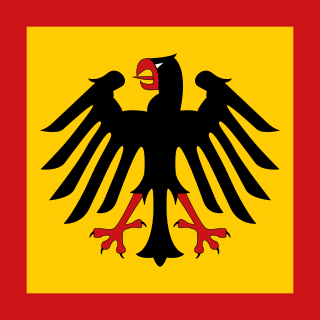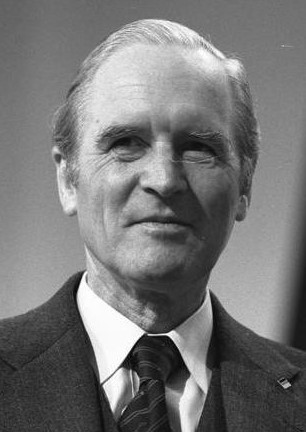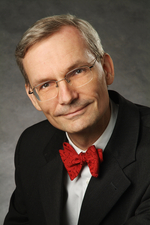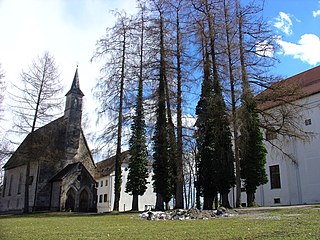
The Bundestag is the German federal parliament and the lower of two federal chambers, opposed to the upper chamber, the Bundesrat. It is the only federal representative body that is directly elected by the German people, comparable to the House of Commons of the United Kingdom or the United States House of Representatives. The Bundestag was established by Title III of the Basic Law for the Federal Republic of Germany in 1949 as one of the legislative bodies of Germany and thus it is the historical successor to the earlier Reichstag.

The president of Germany, officially titled the Federal President of the Federal Republic of Germany, is the head of state of Germany.

The Basic Law for the Federal Republic of Germany is the constitution of the Federal Republic of Germany.

The German Bundesrat is a legislative body that represents the sixteen Länder of Germany at the federal level. The Bundesrat meets at the former Prussian House of Lords in Berlin. Its second seat is located in the former West German capital of Bonn.

Karl Carstens was a German politician. He served as the president of West Germany from 1979 to 1984.
The Federal Convention, also known as the Federal Assembly, is, together with the Joint Committee, one of two non-standing constitutional bodies in the federal institutional system of the Federal Republic of Germany. It is convened solely for the purpose of electing the President of Germany, either every five years or within 30 days of the premature termination of a presidential term. The Federal Convention consists of all members of the German federal parliament (Bundestag) and the same number of delegates from the 16 federated states. Those delegates are elected by the state parliaments for this purpose only.

Otto Ernst Heinrich Hermann Suhr was a German politician as a member of the Social Democratic Party of Germany (SPD). He served as the Governing Mayor of Berlin from 1955 until his death.

Federal elections were held in West Germany on 14 August 1949 to elect the members of the first Bundestag, with a further eight seats elected in West Berlin between 1949 and January 1952 and another eleven between February 1952 and 1953. They were the first free federal elections in West Germany since 1933 and the first after the division of the country.

Paul Gustav Emil Löbe was a German politician of the Social Democratic Party of Germany (SPD), a member and president of the Reichstag of the Weimar Republic, and member of the Bundestag of West Germany. He died in Bonn in 1967.

Thomas Dehler was a German politician. He was the Federal Republic of Germany's first Minister of Justice (1949–1953) and chairman of Free Democratic Party (1954–1957).

Carlo Schmid was a German academic and politician of the Social Democratic Party of Germany (SPD).

The president of the Bundestag presides over the sessions of the Bundestag, the federal parliament of Germany, with functions similar to that of a speaker in other countries. In the German order of precedence, the office is ranked second after the president and before the chancellor.

Michael F. Feldkamp is a German historian and journalist.

Annemarie Renger was a German politician for the Social Democratic Party of Germany (SPD).

The chancellor of Germany, officially the federal chancellor of the Federal Republic of Germany, is the head of the federal government of Germany, and the commander-in-chief of the German Armed Forces during wartime. The chancellor is the chief executive of the Federal Cabinet and heads the executive branch. The chancellor is elected by the Bundestag on the proposal of the federal president and without debate.

Helene Weber was a German politician and was known as a women's rights activist. In the Weimar Republic she rose to prominence in the Catholic Centre Party. In 1945 she was among the founders of the Christian Democratic Union (CDU). In 1948 she was a co-founder of the CDU Women's Task Force, a precursor of the party's Women's Union, which she chaired from 1951 to 1958. Weber is one of four women who, alongside 61 men, drafted Germany's constitution, the Basic Law, in 1948-49. After initial hesitation, she closed ranks with the women delegates of the Social Democratic Party to successfully fight for the inclusion of the sentence "Men and women shall have equal rights" in Article 3 of the Basic Law. She is often cited for her anti-war statement: "The entirely male-run state is the ruin of nations".

The Constitutional Convention at Herrenchiemsee was a meeting of constitutional experts nominated by the minister-presidents of the Western States of Germany, held in August 1948 at former Herrenchiemsee Abbey in Bavaria. It was part of the process of drafting and adopting the current German constitution, the Basic Law (Grundgesetz). The draft document prepared by the Herrenchiemsee convention served as a starting point for the deliberations of the Parlamentarischer Rat in Bonn during 1948 and 1949.

The German Party was a national-conservative and monarchist political party in West Germany active during the post-war years. The party's ideology appealed to sentiments of German nationalism and nostalgia for the German Empire.

Friederike Nadig was a German politician of the Social Democratic Party (SPD). One of the four women members of the Parlamentarischer Rat who drafted the Basic Law for the Federal Republic of Germany in 1948/49, she was one of the Mothers of the Basic Law.

A referendum was held on 9 December 1951 in the states of South Baden, Württemberg-Baden, and Württemberg-Hohenzollern. Voters were asked whether they favoured a merger of the three states into a single state or the re-establishment of the old states of Baden and Württemberg. 69.7% of voters favoured unification with a turnout of 59.2%.



















